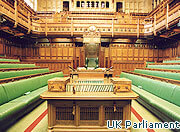MPs are set to debate and vote on legalising controversial techniques to create three and four-parent babies next Tuesday (3 February).
MPs are to have a free vote on allowing the two procedures – Maternal Spindle Transfer (MST) and Pro-Nuclear Transfer (PNT) – which have received widespread criticism over ethical and safety concerns.
The UK Government has previously endorsed the techniques, despite the majority of the public opposing the move in its consultation.
Oppose
Figures showed that of 1,857 responses, 1,152 opposed the idea of three-parent babies, while 700 “expressed general support”. The remainder did not come down on either side.
MPs have already spoken out against the plans.
Conservative MP Fiona Bruce said: “This is a case of genetic engineering; it is the alteration of a potential human being — the removal of certain genes and their replacement with others, to create children.”
No cure
Fellow Tory MP Jacob Rees-Mogg commented: “What is happening is the creation of different people from those who would have been born suffering from the disease”.
“Therefore, this is not curing an existing condition. It is stopping someone being born who would otherwise have been born”, he added.
The New Scientist magazine changed its stance on three-parent babies last autumn, warning that the UK needs to have a “serious debate” about the ethics and safety of three-parent babies.
Ethical concerns
The magazine previously dismissed ethical concerns, but said now it appears “we may have seriously underestimated the influence that mitochondria have”.
The Human Fertilisation and Embryology (Mitochondrial Donation) Regulations 2015 could come into force in October if the House of Commons and the House of Lords approve them.
If legalised, the UK would become the only country in the world to permit the two techniques.
Individuals
MST involves swapping the nucleus in a healthy donor egg with the nuclear DNA from the prospective mother – resulting in a child with DNA from three parents.
PNT creates a child from four different individuals (a chromosomal mother, a chromosomal father, an egg mother and a sperm father).

